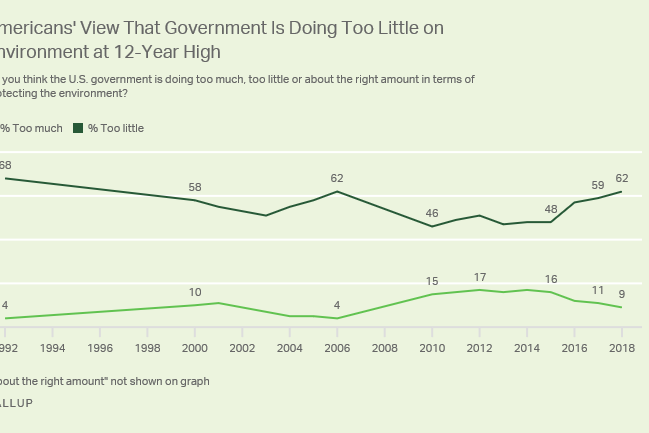
Over the weekend, the Republican Party announced that it has no 2020 policy platform beyond a vow to “enthusiastically support the President’s America-first agenda.” What that agenda entails, in concrete terms, is a mystery to the president himself.
But no matter. The GOP’s decision to forgo the formality of articulating a second-term agenda is itself an uncharacteristically honest declaration of what the party is all about.
To be sure, Republicans do have genuine governing priorities, just few that they wish to publicly advertise. If there was ever a mass constituency for cutting corporate taxes, snipping the social safety net, and deregulating all major industries, there is none today. Trump’s signature legislation was the first unpopular tax cut in modern American history. His attempt to scale back the Affordable Care Act was the most unpopular piece of major legislation on record. And even as the Trump administration wages war on every impediment to industrial pollution, a supermajority of Americans want more environmental protections, not fewer.
It is true that Trump has implemented significant executive actions on immigration that he is happy to campaign on. But these are relatively minor revisions to the preexisting immigration enforcement regime. Trump has not passed any major immigration bills, and there is still no consensus within the congressional GOP in favor of the president’s desired cuts to legal immigration. Meanwhile, for all his demagogic bluster about supporting America’s cops, the president’s annual budgets have called for slashing federal funding to municipal police departments. Which is to say: Even on the question of police funding, Trump is more invested in culture-war symbology than substantive policy.
The Republican Party remains a coalition of reactionary plutocrats, aggrieved small-business owners, and social conservatives united by their mutual contempt for the liberal elite. But as the GOP’s big tent has grown more working class — and the American economy more conspicuously oligarchic — Red America is less united by an affirmative agenda than at any time since the Reagan revolution.
Thus, when Politico’s Tim Alberta asked a range of current and former GOP operatives to describe the party’s governing vision, this was the clearest answer he got:
“Owning the libs and pissing off the media,” shrugs Brendan Buck, a longtime senior congressional aide and imperturbable party veteran if ever there was one. “That’s what we believe in now. There’s really not much more to it.”
Not all Republicans are content with having a campaign agenda that boils down to “Let them eat Colin Kaepernick.” A handful of the party’s rising stars believe that the GOP cannot live on culture-war demagogy alone. Rather, at a time of mass unemployment, small-business bankruptcies, and record share prices, right-wing populists like Josh Hawley insist that the GOP must stop catering to the corporate elite — and start pretending to have an agenda for working people.
Donald Trump has largely abandoned such pretenses since taking office. After portraying Wall Street as the enemy of America’s working class in his final 2016 campaign ad, the president has comported himself as the S&P 500’s cheerleader-in-chief. But Hawley believes that Trump’s pivot to unabashed plutocracy was a mistake and that Republicans should continue trying to erode the Democratic Party’s advantage on inequality by baldly misrepresenting Trump’s economic priorities.
Or so the Missouri senator’s new op-ed suggests.
In a column awkwardly titled “What Will Biden Build Back Better? Big Banks, Big Tech, and Beijing. Look at His Record,” Hawley lands some clean punches on the Democratic ticket. As the Missouri senator notes, Joe Biden “voted to deregulate the financial services industry” in the 1990s. And after those policies helped generate the 2008 crisis, the “Obama-Biden administration made only a half-hearted attempt to help the millions of families who faced foreclosure during the crisis.” Kamala Harris, meanwhile, has indeed “spent years cultivating close ties with Big Tech.” And the Democratic ticket enjoys significant backing from Silicon Valley and Wall Street donors.
But Hawley is not calling for a pox on both parties. He is arguing that, “after four years of President Trump upsetting the status quo on Wall Street, in Silicon Valley and Washington, D.C., in favor of working people, the Biden-Harris ticket is all about the revenge of the elites.”
This is a more provocative argument than “Joe Biden and Donald Trump aren’t as distinct on questions of corporate power as the former wants you to think.” But while Hawley musters some evidence for that less spicy proposition, he offers literally none for his own thesis.
And how could he? Biden did support financial deregulation two decades ago. But Donald Trump and Mitch McConnell pared back the Dodd-Frank bill’s regulations on the banking industry in 2018. Meanwhile, the president has so thoroughly gutted the Consumer Financial Protection Bureau — the agency responsible for policing big banks’ abusive lending practices — that its enforcement activity has fallen by 80 percent on his watch. And of course — like all major industries — Wall Street has reaped a windfall from the president’s tax cuts: Since 2017, the six largest banks in the United States have collectively taken home $32 billion that would have gone to the U.S. Treasury had Donald Trump never gotten the chance to “upset the status quo” in “favor of working people.”
Hawley accuses Biden of presiding over a “half-hearted attempt” to spare ordinary Americans from the worst consequences of the 2008 recession. And yet, right now, Donald Trump is personally blocking an extension of federal unemployment-insurance benefits — in the middle of a recession — because he and his party believe that $600 a week is more support than jobless Americans deserve. And while Biden and Harris have many corporate patrons, the Chamber of Commerce — a business lobby that counts Google and Facebook as members — has donated nearly three times as much money to GOP candidates as it has to Democratic ones this year.
The closest Hawley comes to naming an instance in which Trump upset the corporate status quo in favor of workers is this:
President Trump has made cracking down on China a centerpiece of his economic agenda. He’s levied tariffs on Chinese imports, an action the experts said would be cataclysmic. Turns out the experts were wrong. We are finally managing our trade in a way that protects our vital strategic industries and our manufacturing workers.
There are a few problems with hanging your entire case for Trump’s populist bona fides on “He did some tariffs.” Among them: Trump did not implement tariffs as part of a broader industrial policy but, rather, as a series of sporadic gestures aimed less at generating jobs than headlines. As a result, his protectionism hurt American agricultural producers while doing nothing to avert the decline of American manufacturing. Last fall, when the U.S. was still enjoying an economic expansion, America recorded its lowest level of manufacturing activity since the Great Recession, thanks in no small part to a sharp drop in U.S. exports.
Separately, if you are trying to argue that Trump is a populist scourge of Silicon Valley, citing his trade policies toward China — which include tariffs aimed at protecting big tech’s patent monopolies from Chinese subversions of intellectual-property law — is an odd move. In practice, Trump’s tariffs have not always worked to Silicon Valley’s advantage. But one official aim of his trade policy with China is to defend big-tech firms’ right to monopoly profits at the cost of raising consumer prices for working-class Americans.
This is literally the only policy that Hawley names to substantiate the claim that President Trump has put working people above Wall Street and Silicon Valley during his first term.
But Hawley’s op-ed saves the worst for last:
Over the next few months, pay attention to the speeches made by Biden and Harris. You’ll hear lots about various social causes, no doubt, and the sins of America. But what will they do for America, for the working Americans who built this country? What will they do to protect these Americans jobs, their financial security, raise their wages?
The truth is, these issues no longer matter much to today’s Democratic Party.
Pay attention to Josh Hawley’s op-ed, and you will find that he does not offer a single answer to the question of what, specifically, Trump will do in a second term to protect Americans’ jobs, wages, or financial security. In a column arguing that the Biden-Trump race offers a stark choice on questions of corporate power, the senator doesn’t bother to name anything that Trump would do to rein in Wall Street or Silicon Valley in 2021.
By contrast, if Hawley had paid attention to Biden’s speech at the Democratic National Convention last week, he would have found that blue America’s standard-bearer provided answers to all of those questions. One can argue that Biden’s plan to raise wages through “newly empowered labor unions” or to create “5 million new manufacturing and technology jobs” through a $2 trillion green industrial policy are insufficient or insincere. But they do constitute answers to Hawley’s questions and do feature prominently in Biden’s campaign speeches. The Democrats are not the party that conceals its dearth of answers for middle-class decline beneath “social causes” and culture-warmongering; as Hawley’s own op-ed ably demonstrates, that’s the GOP’s game.































